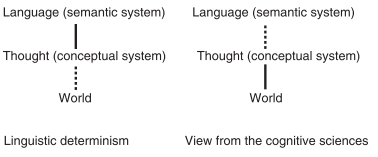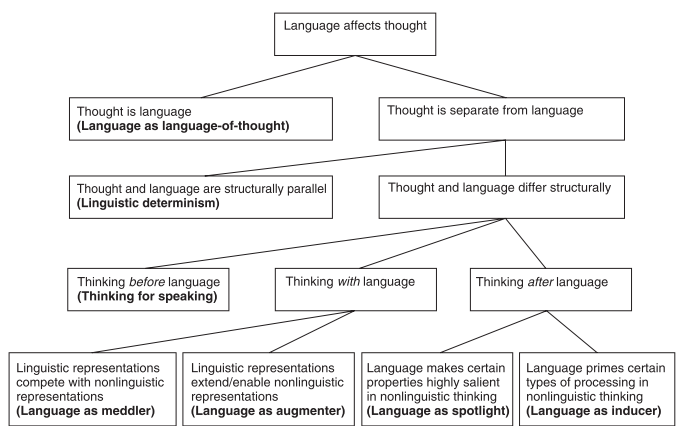Does the language we speak influence or even shape the way we think? Last December, there was an interesting
debate over at The Economist website with
Lera Boroditsky defending the motion, and
Language Log’s
Mark Liberman against the motion (who IMO, both did a very good job).
The result of the online poll was very clear: 78% agreed with the motion, while 22% disagreed.
There are, however, three main problems with this way of framing the question: First, it’s not really clear what ‘language’ really is, second, the same goes for “thought”, and third, there are many many ways of “influencing” and “shaping” something an bee conceptualized.

Different manifestations of the idea of linguistic relativity
Language as Language-of-Thought
In its most extreme form, thought is simply equated with language. But this view, in which the units of thought are simply words from natural language, clearly can’t be right. For example, we can have thoughts that are difficult to express, we can understand ambiguous expressions (like “Kids make nutritious snacks”), and we are able to coin new words that express new meanings. All this would not be possible if we didn’t have a more fine-grained mental representation that that is encoded in words. In addition, research on non-human primates and human infants suggests that they are capable of some sophisticated forms of thought even in the absence of language.
This line of reasoning points to a representational format for concepts, categorization, memory, and reasoning that is separate from language.
On a very general level, then, we can all agree that thought is separate from language. But what about the many different ways language can affect thought?
Here, we can first make a distinction between views that hold that language determines thought (linguistic determinism), and those that hold that there are structural differences between language and thought, but that, nevertheless, language influences the way we think.
Linguistic Determinism

Linguistic determinism, a position most often connected to the name of Benjamin Lee Whorf, separates language from the conceptual system, but holds that the language we speak determines the basic categories of thought. This influence is seen as so strong that it can even overwrite pre-existing perceptual and categories in a way analogous to the way infants lose the ability to notice phonetic distinctions that do not exist in their native language. For example, at 6 months, infants growing up in English-speaking households are able to discriminate sounds that in Hindi are seen as different but in English are not, but at 12 months they have lost this ability and only pay attention to sound distinctions relevant to English (e.g. Dirven et al. 2007).
The linguistic determinism-hypothesis poses that this process also holds for many other areas of perception and, critically, cognition. To quote Whorf:
“The world is presented in a kaleidoscopic flux of impressions which have to be organized largely by the linguistic systems in our minds.”
“We cut up nature—organize it into concepts—and ascribe significances as we do, largely because of absolutely obligatory patterns of our own language.”
(Please note that in most of his writings, Whorf actually argues for a position that is much more sophisticated and subtle than the one expressed in these popular quotes)
If language is given the role of organizing “the kaleidoscopic flux of impressions” presented to us by the world, this means that on this view, there is a very tight connection between what we can call the conceptual system/thought, and language, one the one hand, and a very loose connection between the conceptual system/thought and the world on the other.
A lot of research in the cognitive sciences, however, indicates that the relationship between thought and the world is much tighter than is assumed in linguistic determinism. For example, languages differ in the way they talk about motion events, especially in the way they encode the direction or path of a motion, on the one hand, and the manner of motion on the other:
"Manner languages (e.g.,English, German, Russian, and Mandarin Chinese) typically code manner in the verb(cf. English skip, run, hop, jog), and path in a variety of other devices such as particles (out), adpositions (into the room), verb prefixes (e.g.,German raus- ‘out’; cf. raus-rennen ‘run out’), etc. Path languages(e.g.,Modern Greek, Romance, Turkish, Japanese, and Hebrew) typically code path in the verb (cf. Greek vjeno ‘exit’, beno ‘enter’, ftano ‘arrive/reach’,aneveno ‘ascend’, diashizo ‘cross’), and manner in adverbials(trehontas‘running’, me ta podia ‘on foot’, grigora ‘quickly’)." (Papafragou & Selimis 2010: 227)
However, studies by Anna Papafragou and others suggest that although, say, English and Spanish speakers talk differently about the same motion event, the still remember it similarly:
"both manner and path seem to be available to an equal extent to speakers of different languages for purposes of (non-linguistic) categorisation and memory, regardless of whether these components are prominently and systematically encoded in the language." (Papafragou & Selimis 2010: 229)

These results and other experiments suggesting that in some respects 'thought and language' are less well aligned than 'thought and world' of course pose a serious problem for linguistic determinism.
Other Ways Language Might Have an Effect on Thought
In sum, this means that two versions of the Sapir-Whorf-Thesis – the Language-as-Thought and Linguistic Determinism hypotheses – can be rejected. But this still leaves us with the many ways language can have an effect on thought.
As Wolff & Holmes note it is precisely because" language and the conceptual system differ that we might expect a tension between them, driving each system to exert an influence on the other."
Wolff & Holmes use 5 different metaphors to classify the ways this can happen.
- Thinking for speaking: Language influences thinking when we think about how to express something in language immediately prior to speaking
- Language as meddler: linguistic representations/language and non-linguistic representations/thought can conflict and compete with each other
- Language as augmenter: Language enables or extends certain kinds of thought
- Language as spotlight: Language directs attention to /makes certain aspects very salient in thinking
- Language as inducer: Language can be seen as a primining mechanisms that induces certain ways of thinking about something

In my next post, I’ll elaborate on these 5 subclasses of how language might affect thought.
[Cross posted at Replicated Typo]
References:
Dirven, René, Hans-Georg Wolf and Frank Polzenhagen (2007): "Cognitive Linguistics and Cultural Studies." In: Dirk Geeraerts und Hubert Cuyckens (Hrsg.): The Oxford Handbook of Cognitive Linguistics. Oxford: Oxford University Press, 1203-1221.
Papafragou, Anna and Stathis Selimis (2010): "Event categorisation and language: A cross-linguistic study of motion." In: Language and Cognitive Processes 25: 224-260.
Wolff, P., & Holmes, K. (2011). Linguistic relativity Wiley Interdisciplinary Reviews: Cognitive Science, 2 (3), 253-265
 Edmund Blair Bolles over at Babel's Dawn discusses a very interesting review of "FOXP2 and the role of cortico-basal ganglia circuits in speech and language evolution" by Wolfgang Enard. Be sure to check it out!
Edmund Blair Bolles over at Babel's Dawn discusses a very interesting review of "FOXP2 and the role of cortico-basal ganglia circuits in speech and language evolution" by Wolfgang Enard. Be sure to check it out!



